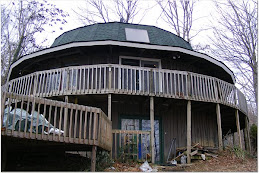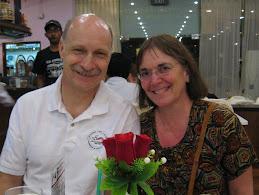In anticipation of having the carpets cleaned on Wednesday, I started cleaning up the floor clutter this morning. I was booking right along, swamping out the canning jar collection, the piles of "to be filed," the heaps of clothes "to be mended," the books that never got home to the bookshelves, when I happened upon a great big compilation of what I like to call "My Breast Cancer Homework."
This was my life, for two whole years. Notebooks full of hospital-provided info, pamphlets on clinical trials, tumor classification flow charts, worksheets on radiation and chemotherapy side effects and remedies, articles ripped out of magazines, medical abstracts printed off the internet. In one giant leap of faith, I heaved the whole hearty mess of it into the trash.
The niggling voice of "what if you need it again?" was drowned out by the pragmatic realization that if I get cancer again, all of this past information will be either uselessly outdated or cheerfully thrust at me again. In a big binder with a pink ribbon on it, thanks so much.
For the moment, it felt great to throw it all out. Liberating, in fact. Nope. Don't need this anymore. Done.
And then tonight, I came across this gem: Rethinking the War on Cancer http://www.newsweek.com/id/157548/page/1
Seems as though 37 years of research hasn't done much except cure cancer in lab rats, mostly because the funding is going to "scientifically elegant" studies that tickle the NCI's curiosity, without showing much in terms of actual human patient benefits.
I certainly can't complain of the advances that I personally benefitted from. But it appears that this dovetails into the ACS's statement earlier this week that the scientists aren't really sure why cancer diagnoses are proliferating at a spectacularly alarming rate, and survival rates aren't increasing proportionally with the increases in early detection. This article explains some of that, and gives a window on why the research is striking out on preventing metastises, which is what kills most cancer patients. And focusing on treatment isn't working out that well, after all.
I have been supremely blessed in my treatment options, and for the moment, all's well. But these rogue cells are sneeky little buzzards. They mutate (that's what started the problem in the first place), and they adapt. For every treatment thrown at them, they seem to find a way around it. And so far, the scientific approaches haven't begun to understand the mechanisms of why good cells go bad.
The one sure thing that cancer taught me was that we all have an undetermined expiration date. This was of course true before I had cancer--it just took that experience to make me believe it. I am more determined than ever to enjoy and treasure the life I have, and make every moment count. We don't get to choose what happens to us. We only get to choose how to live with it.
Subscribe to:
Post Comments (Atom)





No comments:
Post a Comment